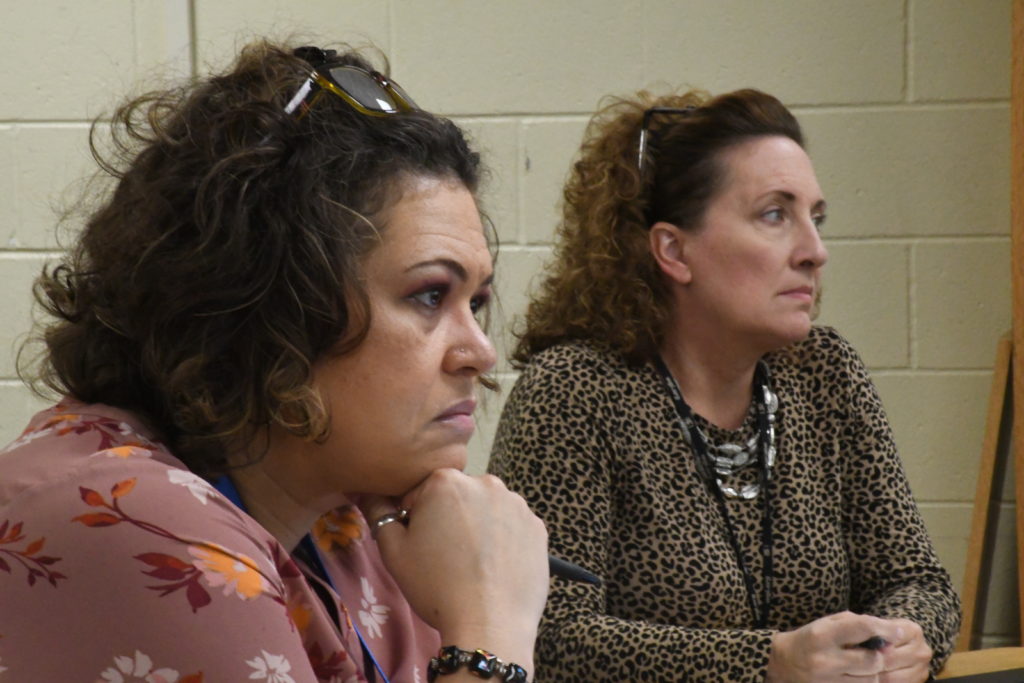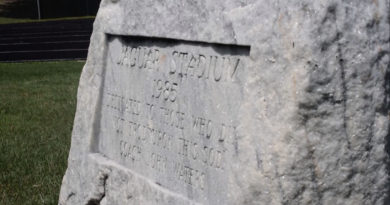Educating the educators
The 2022-23 school year is the first to start with a full group of instructional coaches, with a specialized content coach in each academic subject area at Cedar Shoals.
“I would describe it as a position designed to support the teachers, help them improve their practice. Not only sharing strategies, but doing walkthroughs and talking with the teachers about their goals and how they want to improve as teachers,” social studies instructional coach Andrew Vernor said.
In his position, Vernor assists world history and government teachers alike. Entering his second year as an instructional coach at Cedar Shoals, Vernor also teaches AP Human Geography.
“We help them reflect and learn from not only what we do in the classroom, but also the data sets that we generate. Really trying to support the teachers in that way and create a venue where we can come together and discuss those things in a way that is hopefully positive and supportive,” Vernor said.
A coach’s responsibilities are diverse, including compiling and analyzing data, coordinating tests and quizzes, helping with time management and aligning curriculum to keep teachers on track.
“We’re taking what the state tells us that we need to do in order to meet the goals and then we come down to the district level. And then we align the curriculum that the district has adopted so that we can improve instruction,” math instructional coach Christine Guske said.
After teaching Algebra I at Cedar, Guske became an instructional coach this school year. Though she was planning to enter a curriculum based profession from the start, Guske has also held positions as an assistant principal and assessment professional. Now as the math instructional coach, she assists teachers in the math department, from geometry to calculus.
More specifically, instructional coaches connect with teachers in their department. Through professional learning communities (PLC’s), coaches meet with teams of teachers for each academic course offered in their departments, helping to find places for improvement. PLC’s give room for reflection and help teachers find the best teaching strategies moving forward.
Instructional coaches fill collaborative roles with teachers. For instance, after data covering test results is compiled and analyzed, instructional coaches bring this information to the teachers. During PLC meetings, coaches relay this information and facilitate discussion about how to proceed.
In a recent world history PLC meeting, Vernor sat with teachers Beth Mendenhall, Ron Helm and Jennifer Goff, all teachers on that team. The group discussed the approaches that were taken during the week. Mendenhall brought up an Edpuzzle discussing the 1800’s cholera outbreak in Europe, and all world history classes had incorporated the activity into their lessons that week. After conversing, the team concluded that this was an engaging activity for students and then wondered how similar activities could be introduced.. Vernor then led a new conversation about a recent test, asking how students felt and examining results. Since each teacher in the PLC gave the same test, the differences in scores illuminated how one teacher may have found more success with certain topics or methods.
“No two teachers are the same. They’re going to emphasize different things. You have to see that even though one instructor may put a big emphasis on something and the other one may not, does that hurt or harm or change the educational experience of the students? Because everybody keys in on different things,” Helm said.
Hannah Doolittle, English department, emphasizes possible struggles with collaboration across her department.
“We have this content that we like to teach, so sometimes it can be difficult or there can be some resistance to planning collaboratively. But having an instructional coach there can help grease the wheels a little bit,” Doolittle said.
When it comes to experience, a veteran teacher’s needs differ from a new teacher’s, and Guske says these differences influence how improvements are interpreted.
“I’ve seen some big changes, especially with the new teachers. The ones who have been here a while, I think it’s going to take maybe a little bit longer, because they’ve already been here and there’s not as much of a growth curve at this point,” Guske said.
Experience also affects how well a coach’s assistance will be received or how much is needed. As Guske said, a more seasoned teacher may already have systems or approaches in place and may not need the same guidance that a new teacher needs. An experienced teacher has had time to develop concrete, tested lesson plans, assessments and rules that work for their classroom, while a new teacher hasn’t had the same opportunity. An instructional coach acts as a mentor in that sense, guiding teachers over obstacles. Determining where teachers can benefit is another important role the coaches have.
“My job is to listen and respond in kind and find a balance in, ‘Okay, how much do I push? How much do I pull back?’ And doing this balancing act around knowing my teachers, and what they need. But also knowing when to press them a little bit and expand their capacity for greatness,” English instructional coach Katie Bittler said.
While this is her first year at Cedar Shoals, Bittler holds years of experience as a high school English teacher, counselor and life coach prior to this position.

“I took some time off and then came back, so this is my third year back in. But this is my first year as an IC. I just really love the work. So it’s a really good fit for my personal value and my professional value system. I believe so strongly in the power of people who feel empowered and who received the message that they can do it,” Bittler said.
The ultimate goal of an instructional coach is the improvement of the student experience as a product of the guidance they offer to teachers.
“I’m hoping that they (students) see their classes become more engaging. I hope that they see and feel that their teachers are doing everything they can to support their learning through different strategies, through different lenses, differentiation, so that they have access to the material and they’re able to really shine,” science instructional coach Melissa Paul said.
Paul is heading into her second year in the coaching position, and also teaching one block of human anatomy.
Cedar may have a full staff of instructional coaches, but that hasn’t always been the case. Last year, two coaches were stretched between four subjects, with Vernor leading social studies and language arts and Paul leading science and math.
“It was a lot to try to be an effective coach with so many different teachers and so many different needs. In all honesty, my background is more in science. Yes, math is the language of science, you can’t have one without the other. I learned a lot, but I don’t feel like I had all the necessary skills to provide them with targeted support to specifically help them. I was able to do it through a science lens, and that makes it challenging because they have a different style. They have a different curriculum. That was hard, so I’m thankful to have four coaches now,” Paul said.
With all four subject areas represented, each instructional coach has taught the subject they help with. Having all been in the same position, the coaches can provide personal experience as another layer of assistance.
“I have a very diverse background with the standards and in these classes, which I feel has really helped me. Because I feel like I can empathize with teachers when they’re struggling or (when) they’re like, ‘Hey, I don’t know what this should look like.’ I’ve been there and so leaning on where those gaps may be when I was a learner and (my) struggles has been extremely helpful,” Paul said.
From her perspective in her third year of teaching, Doolittle sees the value in the work of instructional coaches as they help teachers reach their full potential.
“People have different opinions on instructional coaches, for good reasons, but I always try to look at it as, ‘This is a person who wants to help me and wants to help kids.’ I also want to help myself and want to help kids, so I think starting on that foot has really helped me understand what instructional coaches can do for me,” Doolittle said.




